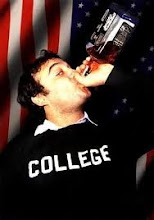 |
| Four Days after his Axis partner Japan attacked the USA, Hitler declared war on America |
We're a little late on this one, since the 70th anniversary of Adolf Hitler's wildly self-destructive unilateral declaration of war on the USA was 6 days ago.
But reprinted below is a wonderfully cogent explanation of American's powerful mobilization against Hitler's National Socialists -- as well as against his murderous Imperial Japanese allies, that it provoked.
Included, very nicely, is music from the era. It is reprinted, by permission from the Chicago Schlager Music Review -- ed.
Here it is from the Chicago Schlager Music Review of December 11th, 2011:
 |
| Hitler Told Germans That The American Men Would Not Fight -- WOW!, Was He Ever Wrong! |
70 years ago today, Adolf Hitler, the elected National Socialist leader of the German Reich, unilaterally declared war on the United States of America.
Four days earlier, The USA had been attacked by Hitler's Axis ally, the Empire of Japan, which bombed the US naval base at Pearl Harbor in the American territory (now a State) of Hawaii, killing 2,800 Americans.
Declaring war on the USA was, perhaps Hitler's biggest mistake ever.
The Anglophilic US President, Franklin D. Roosevelt, had been looking for a way of getting the US involved militarily in saving Great Britain from the Nazi onslaught.
But due to formidable pressures from the millions of German-American and Scandinavian-American voters in the Midwestern US (who did not want to send their sons to fight German boys) and the millions of city dwelling Irish-American voters (who had nothing but contempt for their long-time enemy, Great Britain) Roosevelt was unable to convince Congress to enter the European war.
But with his unilateral declaration of war on America on December 11, 1941, Hitler unwittingly solved Roosevelt's political problem.
After Hitler declared war on the American people, its elected representatives in the U.S. Congress reciprocated on December 12, 1941.
 |
| By 1944 American Workers Were Turning Out 9,000 Warplanes a Month -- More Than 300 a Day |
In so doing, Hitler put the German people at odds with the greatest industrial power on the face of the earth.
Within a few short years, American workers would be turning out 300,000 combat aircraft -- (at one point 9,000 planes a month -- more than 300 a day) -- and 200,000 tanks and almost 1 million heavy artillery pieces.
20 million American men would leave civilian life and take up arms (including this writer's German-American father and uncles) and become one of the most potent fighting forces ever to take the field in world history.
Those civilian-soldiers fought two powers on two widely divergent fronts, ranging from Burma and China in the West all the way to Berlin and Prague in the East.
Hitler scoffed at Americans calling them "a bunch of undisciplined gangsters who would never fight."
But one Wehrmacht Lieutenant in Italy wrote in his memoirs after the war, "They told us the Americans would never fight. But when the Americans kept coming and coming up the hill at us -- wave upon wave -- I was never so scared in my life."
 |
| As Usual, The Americans Went To War With Song |
His sentiment was echoed by the Wehrmacht and Waffen-SS men who looked out from their bunkers on Hitler's fortified "Atlantic Wall" on the morning of June 6, 1944, only to see the sea filled with thousands of American and British ships of all kinds and the skies filled with US warcraft in what was the greatest amphibious military invasion in world history.
38% of the United States Armed forces consisted of German-Americans, including the Supreme Commander of the Allied Forces in the Eastern Theater of Operations, General Dwight D. Eisenhower (later an American President) and a key combat General on MacArthur's Pacific command, General Robert Eichelberger.
In fact, Americans had a wartime joke that went: "The reason we won the war was because our Germans were better than their Germans."
And as usual, Americans went to war with music.
Here is the very famous Big Band hit of 1943, "The American Patrol," by the famed US trombonist and Big Band orchestral leader, Major Glenn Miller.
At age 38, Miller was too old to join the US Army, but he pulled political strings and obtained entry into the US Army Air Corps and was tragically killed when his plane went down over the English Channel when he was on his way to entertain US and British troops in France. "The American Patrol" was among his greatest ever compostions:
Here is the Andrews Sisters big US wartime hit, "The Boogie Woogie Bugle Boy of Company B":
"He was a famous trumpet man from 'round Chicago way.
He had a boogie style that no one else could play.
He was the top man in his craft.
But then his number came up and he was called to the draft.
He's in the Army now.
A blowin' reveille.
He's the boogie woogie bugle boy of company B."














Seems like we used to have song for everything! :) I miss that.
ReplyDelete